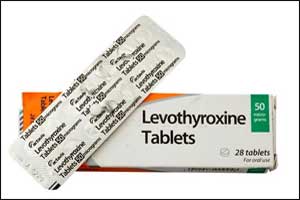- Home
- Editorial
- News
- Practice Guidelines
- Anesthesiology Guidelines
- Cancer Guidelines
- Cardiac Sciences Guidelines
- Critical Care Guidelines
- Dentistry Guidelines
- Dermatology Guidelines
- Diabetes and Endo Guidelines
- Diagnostics Guidelines
- ENT Guidelines
- Featured Practice Guidelines
- Gastroenterology Guidelines
- Geriatrics Guidelines
- Medicine Guidelines
- Nephrology Guidelines
- Neurosciences Guidelines
- Obs and Gynae Guidelines
- Ophthalmology Guidelines
- Orthopaedics Guidelines
- Paediatrics Guidelines
- Psychiatry Guidelines
- Pulmonology Guidelines
- Radiology Guidelines
- Surgery Guidelines
- Urology Guidelines
10 percent of patients on levothyroxine have continued symptoms

Hypothyroidism is a common disorder, and replacement therapy with levothyroxine (LT4) is the standard treatment.Hanneke Wouters at the University of Groningen and associates conducted a large population-based study and found People who take replacement thyroid hormone may have more comorbidities and lower quality of life than those who don't take the hormone.The study results have been presented at ENDO 2018, the 100th annual meeting of the Endocrine Society in Chicago, Ill.
"Unfortunately, about 10 percent of patients on thyroid hormone continue to experience symptoms and disturbed well-being, despite the fact that their blood thyroid hormone levels are within the normal range," said lead study author Hanneke Wouters, an M.D./Ph.D. student at the University of Groningen.
"We demonstrated that individuals treated with thyroid hormone had a lower quality of life compared with matched individuals not using thyroid hormone. Also, thyroid hormone users had more comorbidity than non-users. Furthermore, the presence of comorbidity seemed to have more negative impact on the quality of life of LT4 users compared with non-users," she added.
Wouters and her colleagues reviewed the records of 34,440 participants from the Dutch Lifelines cohort study, including data on their medical history, thyroid hormone concentrations, medication use and quality of life. They evaluated health-related quality of life using the RAND-36 questionnaire to examine physical, social, psychological and general health, as well as pain and vitality.
The authors considered comorbidity to be medication use other than LT4 and oral contraceptives, or conditions such as migraine, for which patients are not always prescribed medication.
Of the 955 individuals who used LT4, 80.6 percent had comorbidity, compared with 66.0 percent of those who did not use LT4. Overall, 60.0 percent of those taking LT4 had normal TSH levels, while 89 percent of those not using the drug had normal levels.
LT4 users had lower scores on almost all health-related quality-of-life domains compared to non-users.
The presence of comorbidity had more impact on health-related quality-of-life among individuals using LT4 than among those not using LT4, especially on physical functioning and general health.
"This study demonstrates that attention to comorbidity in patients with hypothyroidism is indicated," Wouters advised.
The Netherlands Consortium for Healthy Ageing (NCHA) and Biobank Standardisation and Harmonisation for Research Excellence in the European Union (BioSHaRE-EU) funded the study.

Disclaimer: This site is primarily intended for healthcare professionals. Any content/information on this website does not replace the advice of medical and/or health professionals and should not be construed as medical/diagnostic advice/endorsement or prescription. Use of this site is subject to our terms of use, privacy policy, advertisement policy. © 2020 Minerva Medical Treatment Pvt Ltd